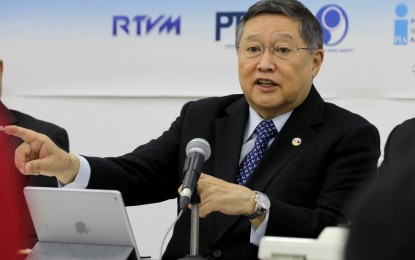
Finance Secretary Carlos Dominguez (PNA File Photo)
MANILA -- Finance Secretary Carlos Dominguez said on Wednesday the High Court’s ruling increasing local governments’ internal revenue allotment (IRA) is projected to increase the share of government’s budget gap on domestic output.
“That’s going to create a fiscal problem, which in our estimates, without doing anything, would drive up our deficit from 3.2 percent to 4.1 percent (of gross domestic product). That is not acceptable,” he told senators in a hearing.
Last April, the Supreme Court (SC) affirmed with finality its ruling increasing the IRA, which previously is only 40 percent of the Bureau of Internal Revenue’s (BIR) collections.
Aside from the share from BIR revenues, the SC decision said the IRA should also be taken from, among others, the tariff and duties collected by the Bureau of Customs (BOC), 50 percent of value-added tax (VAT), 30 percent of national taxes collected in the Autonomous Region in Muslim Mindanao, 60 percent of national taxes collected from the exploitation and development of national wealth, and 85 percent of excise tax from tobacco products.
To address the impact of the additional expenses on national government, Dominguez raised the possibility of giving to the local governments the responsibility of financing health and education-related expenses, as well as the construction of roads in their areas.
Another option is requesting lawmakers to pass a law that will reduce IRA allocation to 30 percent or for the President to declare as unmanageable the fiscal deficit as a result of the new IRA policies.
Dominguez pointed out this issue has evolved from being a fiscal problem to “a political fight.”
But he said declaring the resulting fiscal gap as "unmanageable" is not expected to negatively impact on the country’s investment grade credit rating.
“It will be positive because we recognize it and we’re not implementing a decision that’s unmanageable,” he added. (PNA)
